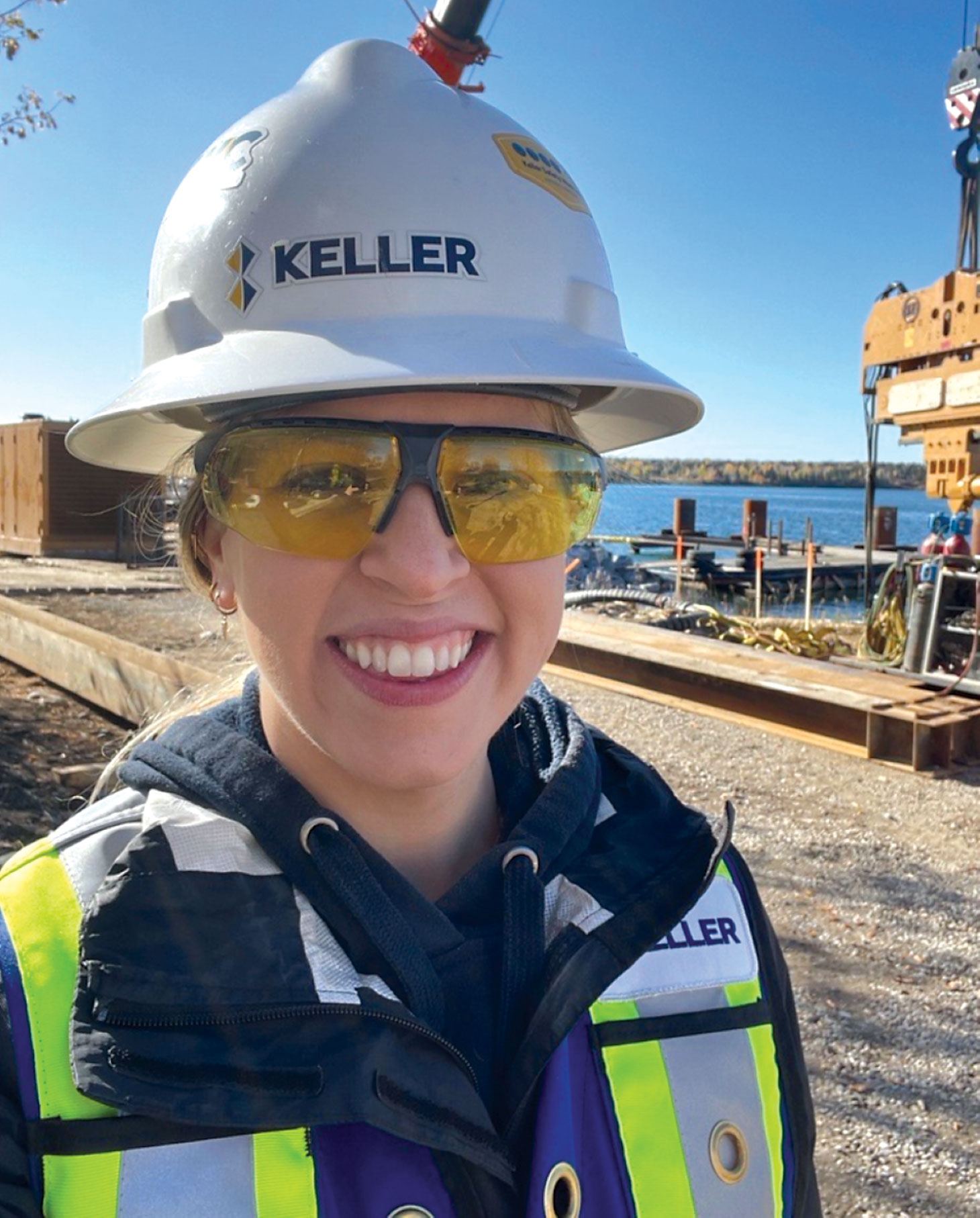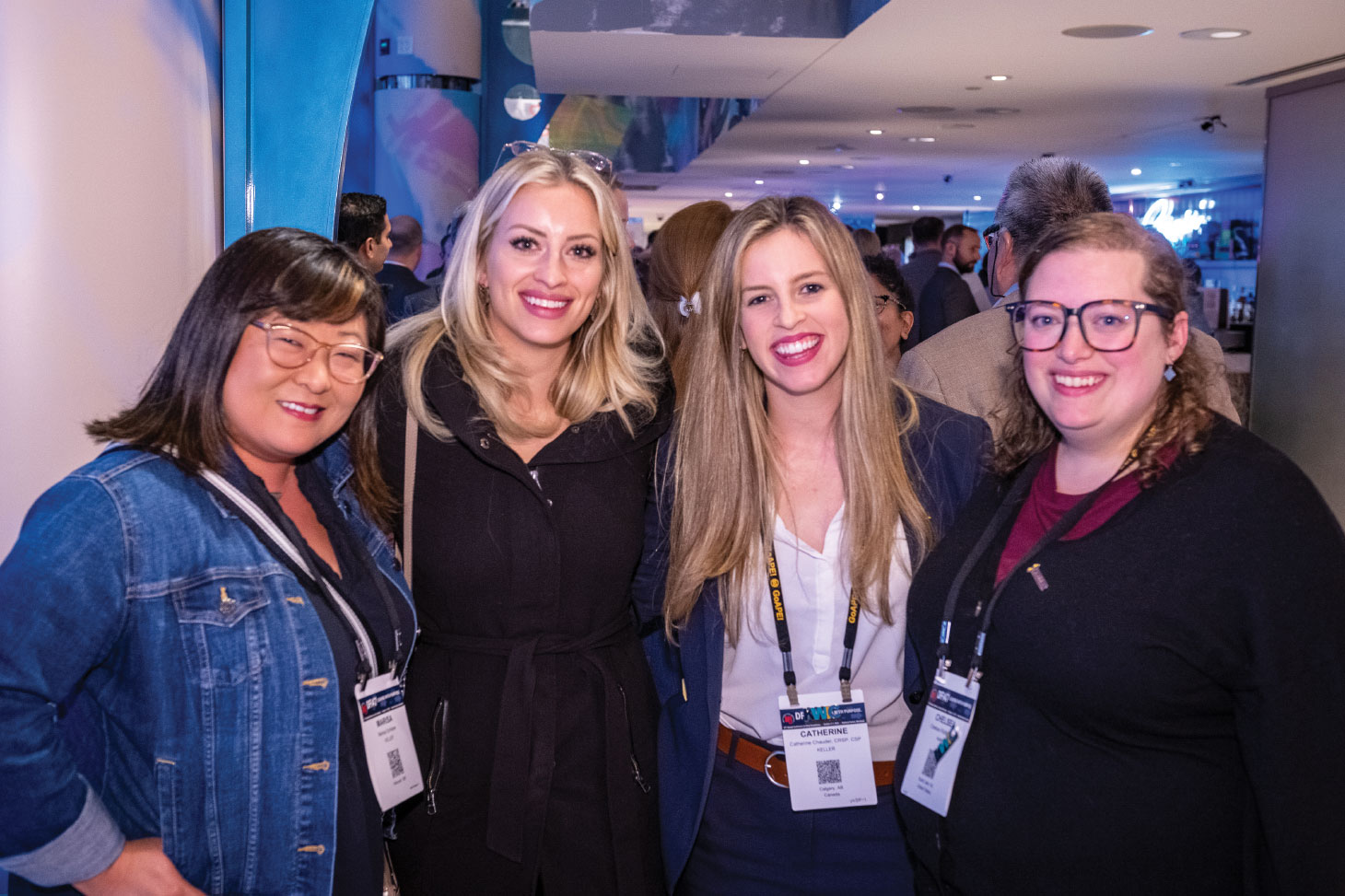
As a Keller health, safety, environment and quality (HSEQ) manager with a history of working in the oil and energy and construction industries, Catherine Chauder didn’t expect to have a career in deep foundations at all.
“I started working for Keller’s ‘Cyntech’ division, which performs vessel and tank repair, cleaning and maintenance, which is something I was well versed in from working for an oil and gas owner-operator,” she said. “And after working there, a (HSEQ) manager position opened within Keller’s main operations.”
Coal miner’s daughter
Growing up in Glace Bay, N.S., Chauder smiles and calls herself a “proper coal miner’s daughter.” Like many other East Coast Canadians, she started her journey west by making a brief two-year pit stop in Toronto for university along the way. She then followed her career to the oil field, spending time in Cold Lake, Alta., and has been living in Calgary for the last seven years.
She says that during the first three years of her career, she worked for an oil and gas owner-operator, which exposed her to plant operations, pipeline construction, oil well drilling, infrastructure development and more.
Regardless of the scope of work, most industries follow the same provincial (occupational health and safety) regulations, so entering the deep foundations industry wasn’t that different. My biggest adjustment was not building new skills or competencies, but building new relationships and learning how the business runs,” Chauder said.
As an extrovert, she loves her position as HSEQ manager, as it allows her to collaborate with different teams and leverage those relationships to solve problems.
“Health and safety is a field that works with every layer of a company and requires a lot of collaboration to be successful. I’m constantly learning from others and can confidently say I have a great team, both within the HSEQ department and across Keller,” she said.
When asked what she likes most about the deep foundations sector, Chauder doesn’t miss a beat.
“I love equipment and innovation. No matter how many times I go to the field, I’m always so fascinated by the way the ground crew and equipment operators work together. It’s like watching a well-rehearsed dance. There are a lot of cool innovative projects up for bid right now like high-speed train loops and carbon-capturing facilities, but I’d also take on a high-rise condo any day,” she said. “As a safety representative for Keller’s internal micropile and anchor product team, I get the bonus of visiting projects outside of my region that I may not usually get to see.”
Career challenges
While Chauder is incredibly happy in her career and current position, it has certainly not been without its challenges. She says one of the biggest challenges she has faced is maintaining her personal identity while also trying to establish a sense of belonging.
“There’s a lot of pressure to be ‘one of the boys,’ which can be exhausting if you must alter yourself to conform to the ideal mould of a ‘construction worker,’” she said.
“Early in my career, I thought this was the only way to survive in a male-dominated industry because I watched other women burn out if they didn’t. I realized later that the women weren’t leaving because they couldn’t ‘cut it.’ They were leaving because they found a place in another industry where they could be their authentic selves.”
“Industry and employers need to speak to women directly about what they need to feel empowered in their field, and what they need to continue their professional growth.”
Catherine Chauder, Keller North America
Overcoming these challenges – especially early in her career – was not always easy, Chauder says.
“I didn’t know any experienced women in safety whose path I could model. Like many other women in the industry, I had to build my own support network, which consisted of my peers who were facing the same barriers, and we tried our best to figure it out together. It made the experience feel a lot less isolating and significantly more empowering, knowing that we were paving our own way.”
Promoting diversity and inclusivity
As a woman in the construction industry, she knows a large part of promoting diversity and inclusion in the field is showing up, being visible and accessible. Chauder participates in diversity and inclusion-focused groups including Keller Women in Construction, Deep Foundations Institute’s Women in Deep Foundations committee, and recently joined Keller’s Diversity, Equity and Inclusion advisory committee.
“I try to be involved in at least one initiative per quarter, and reach out to Keller’s new hires to ensure they feel welcome and included right from the beginning.”
When asked if she has ever mentored women in deep foundations, she says she has tried, but most of the women she currently works with are following different career paths or have much more industry experience than herself. “I have, however, mentored a handful of men, which I think is equally important as mentoring women.
Due to the current demographic of the industry, a lot of men will go their whole careers without having a female supervisor, so being a female mentor and manager to men is a huge responsibility that I take very seriously,” she said.
While Chauder has not worked directly with many other women, she has certainly felt the impact they had before she arrived.
“I felt welcomed when I stepped onto my first deep foundation jobsite, but I know that wasn’t always the case for others. Eye rolls from workers have turned into smiling waves,” she said.
She says that the competitiveness that used to exist between women for a spot on a team of men has turned into kinship and support. Women have worked hard to prioritize relationships within the industry to ensure it’s a more welcoming place for the younger women following behind them.

As for what the industry can do to be more welcoming and inclusive of women, Chauder says she has seen a great deal of effort come out of employer recruitment and industry committees about attracting more women to the industry through high school outreach, university talks, career fairs and more.
“However, another challenge entirely is getting women to stay once they arrive. Industry and employers need to speak to women directly about what they need to feel empowered in their field, and what they need to continue their professional growth.”
Her advice for aspiring females in the deep foundation industry is to never underestimate the value they bring. “Being one in 10 is hard, but your perspective and experiences are just as important as the other nine.
By advocating for yourself, you’re also advocating for other women, so your voice carries farther than you realize,” she said. “Building a professional support network that you can trust is incredibly important. Not only will it make you feel less isolated, but the respect earned will cascade into other extended groups.”
Opportunities always arise
As for her future plans for her career, Chauder says if she has learned anything over her career, it’s that opportunities will always arise.
“My strategy has always been to keep as many doors open as possible. That’s why I enrolled in STEM bachelor’s degrees in university twice, why I pursued my Canadian Registered Safety Professionals and Certified Safety Professional designations as soon as I was eligible, and why I said yes to a promotion that put me in an industry I knew nothing about. It was never my plan to end up in construction, let alone deep foundations, but I’m really happy that I’m here,” she said. “I’m currently focusing on what’s around me instead of what’s ahead.”
As for her time away from work, Chauder says she usually has a home project or hobby on the go.
“My wife and I play together in a women’s soccer league, so I use that as a staple for work-life balance and try to plan my work travel around our matches.”